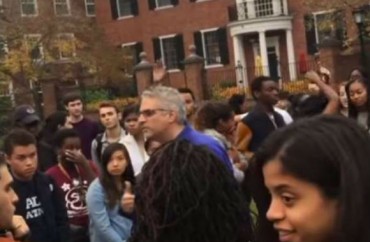
UPDATED
The role of Black Lives Matter in Ivy League ‘fragility’
WASHINGTON, DC – When Yale University students publicly berated Nicholas Christakis for four hours over his wife’s views about Halloween costumes in 2015, the national backlash against their behavior missed a “darker scandal,” according to a new mini-documentary.
The Ivy League school has transformed into an “administrative squid monster” that prioritizes the satisfaction of student whims through an ever-expanding bureaucracy, in the words of Silence U Part 2.
It’s the sequel to filmmaker Rob Montz’s mini-documentary about his alma mater Brown University, released last summer, and it largely follows the Montz-narrated structure of the first Silence U.
Montz gave a preview screening of his latest work Monday night, followed by a panel discussion with a Yale alum who contrasted today’s campus climate with that of the mid-2000s.
Other Yale alumni, including a 2016 graduate who witnessed the Christakis shoutdown, shared their experiences from the audience. The film will debut on WeTheInternet.tv March 21, followed by screenings in Los Angeles.
The recent violent protest at Middlebury College against libertarian scholar Charles Murray shows that campus attacks on free speech are “not right-wing sensationalism” but evidence of institutional “rot,” Montz said to introduce the screening.
Don’t ruin your future by saying ‘controversial things’
The documentary portrays a university that has drifted far from its 1974 Woodward Report, a defense of freedom of expression against justice-minded suppression in the Vietnam era.
It begins with footage of the angry crowd around Christakis, then the master of the Silliman residential college, defending his wife Erika’s views.
Also a professor and associate master of Silliman, Erika Christakis had recently challenged an administration email about rules against “appropriative” Halloween costumes. The documentary shows a photo of the student who filed the initial complaint against her – dressed in an appropriative Aladdin costume for Halloween.
Out of dozens of students who had publicly defended Erika, only one student agreed to appear in the documentary, Montz narrates. Grace Pan says she was accused of violating her status as a “queer woman of color” for expressing her unexpected views.
The other students “don’t want to jeopardize their ascension into America’s ruling class,” Montz narrates, quoting one student who said there’s no professional benefit to saying “controversial things.”
Nicholas Christakis, a sociologist and physician, was a peculiar figure to target, according to his Yale colleague Douglas Stone: His research is saving lives around the world. A photo shows a younger Nicholas, who is of Greek descent, with his nonwhite siblings.
In the crowd footage, a student scolds Nicholas and says “now I want your job to be taken from you.” As Montz narrates, “these are moves of power, not moves of reason.”
The student protesters next target a free-speech conference that was happening on campus at the same time the Christakises became radioactive.
One makes it into the room to lunge toward and shout down Foundation for Individual Rights in Education President Greg Lukianoff, who had filmed some of the interactions between Nicholas and students.
Lukianoff’s offense was apparently joking that the students who yelled at Nicholas had acted as if he had “burned down an Indian village.”
Montz reminds viewers that this is the home of the Woodward Report.
‘Cookies and puppies’ over intellectual rigor
What’s behind this shift? University of Pennsylvania Law Prof. Amy Wax, a Yale alumna, says the school has become an “entertainment warehouse” for students.
A video montage shows the plethora of non-academic social activities Yale offers, including a promotional video full of student choreography.
Former Yale English Prof. William Deresiewicz, whose bestseller Excellent Sheep scolded the Ivy League for producing students who couldn’t think critically, blames the increasing number of administrative offices that cater to students’ every whim.
He points to the presence of four dean-level Yale officials in the crowd that berated Nicholas Christakis, none of whom spoke up. They included the author of the original Halloween costume email, Senior Associate Dean Burgwell Howard.
It’s this non-academic bureaucracy that Montz terms the “squid monster,” which is “chowing down on the very heart of the university.” He cites the university’s $50 million faculty diversity initiative, a direct response to the fall 2015 protests.
Showing social media postings from Yale offices, Montz narrates that administrators seem more interested in handing out “cookies and puppies” than promoting intellectual rigor.
Interspersed with footage of offended students yelling, Yale President Peter Salovey says days after the Christakis shoutdown that the community shares the same values.
‘A lot of the liberals on campus didn’t want to debate’
The crazy thing about the Halloween costume debacle is “there’s no history of racist Halloween costumes” at Yale, 2006 alum and journalist Jamie Kirchick said on the post-screening panel.
“It was the same email that he wrote at Northwestern!” he exclaimed: Howard had held a similar position at the suburban Chicago university in the middle of an actual costume controversy. (In a report on Howard’s 2015 exit, The Daily Northwestern notes his new role in an ambitious Yale effort: growing undergraduate enrollment by 15 percent in a single year.)
Yale was a different place in the George W. Bush administration, Kirchick recounted. Students twice hosted the controversial Middle East scholar Daniel Pipes, a vocal critic of “radical Islam,” with no attempted shoutdowns.
But there were clues as to who was interested in intellectual exchanges, he said: Conservatives dominated the Political Union, a debating society. “A lot of the liberals on campus didn’t want to debate. They were out protesting,” said Kirchick, author of the new book The End of Europe.
Then-Yale College Dean Jonathan Holloway wasn’t interested in debating either, according to Montz. In footage that didn’t make it in, students surround Holloway – a black professor of African-American history – and call him a “race traitor” for not swiftly condemning Erika Christakis.
“In that moment” Holloway could have challenged the ignorance of students with his “vast intellectual arsenal,” yet days later he joined with President Salovey in apologizing and announcing the new diversity initiative, Montz said.
Yale has “the best minds on planet earth,” he continued, and the “administrative apparatus” won’t let them challenge their students with controversial ideas.
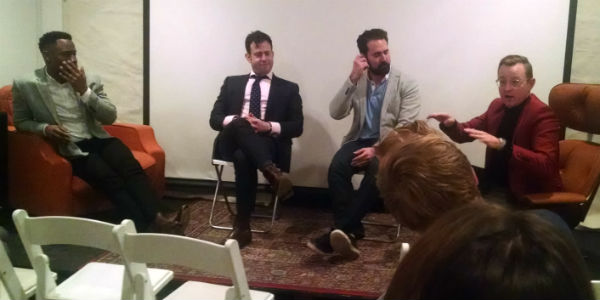
(left to right: Kmele Foster, Jamie Kirchick, Lou Perez, Rob Montz)
“Yale certainly is a business” and if students wanted intellectual rigor, “then this business would in fact serve them,” said Freethink Media partner Kmele Foster, who made the North Korean propaganda documentary Juche Strong with Montz.
Instead, it’s full of students who know full well there are “categories of things we cannot discuss” without threatening their careers, so they avoid the conversation, said Foster, who co-hosts the libertarian podcast The Fifth Column.
Foster said Yale students were culturally ignorant in their offense at certain Halloween costumes. “All culture is appropriation … you are borrowing from various places,” he said, noting that’s why he purchased an outfit resembling a monk’s robe.
But the main goal of “the church of antiracism,” as Columbia linguist John McWhorter calls the loose-knit movement, is to “come out against anything that seems racially insensitive … even if we overcorrect,” Foster said.
And the focus on race is obliterating more important discussions about class imbalance in the Ivy League, said Montz, recommending the nonfiction book The Short and Tragic Life of Robert Peace.
It tells the story of a black Yale student whose brilliance couldn’t overcome his rough upbringing in Newark, which isolated him from the privileged majority at Yale, black and white.
‘They need students to be unhappy to justify their expansions’
Yale alumni in the audience also shared their perspectives.
2003 graduate Peter Somerville said “the customer service mindset takes over” in students when tuition is so high – the sticker price will be $69,000 next year.
It’s paying for the so-called squid monster, said Montz. Pointing back to the violent Middlebury protest in response to a social scientist whose work students had never read, he said that administrators “need students to be unhappy to justify their expansions.”
2016 graduate Ugonne Eze pointed to another factor: the pursuit of “social cachet.”
Students who don’t express “the right ideas” can’t attain the high-level connections they need to justify their Ivy League educations. They are “radicalized” by their peers, and they speak the language of intersectionality and oppression by the time they graduate, Eze said.
The only dissent to the prevailing orthodoxy is expressed by the “far right,” he said, and “you don’t want to be affiliated with the crazy guy” who invited Milo Yiannopoulos to campus.
Kirchick confirmed that he, unlike the leaders of the black, Latino and LGBT associations, was never tapped to join an exclusive Yale group.
But as a young Jewish student, he did attend a campus speech by an antisemitic black writer who had been invited by a black dean – the same person who would condemn the Christakises a decade later. “It was a really important stage in my development as a young man,” Kirchick said.
Black ‘hyperbole’ and white hesitance
The Yale Halloween freakout can’t be analyzed outside the growing influence of the Black Lives Matter movement at that time, said Foster. A young black woman who yelled at Nicholas Christakis that “we are dying” was using the “vernacular” of the movement.
It speaks to the perception of black people that they are “at a unique risk” even in safe settings, and the BLM movement only heightens their “fragility,” Foster said. Perhaps Yale has now decided that this “hyperbole” around offensive words is “the new boundary line.”
Kirchick chimed in that white people are loath to tell a black person “you’re being ridiculous,” regardless of the circumstances: Everyone is afraid of being called racist.
And professors don’t want to challenge illiberal students, because “these kids cycle out every four years anyway,” said Montz, claiming that a “relatively small slice” of the professoriate is actually egging on raucous student protests.
UPDATE: The original title of the documentary that Montz gave The Fix will not be used when it officially debuts. Its name will be Silence U Part 2. The article has been amended accordingly.
Like The College Fix on Facebook / Follow us on Twitter
IMAGE: Greg Lukianoff/YouTube, ABC News/YouTube

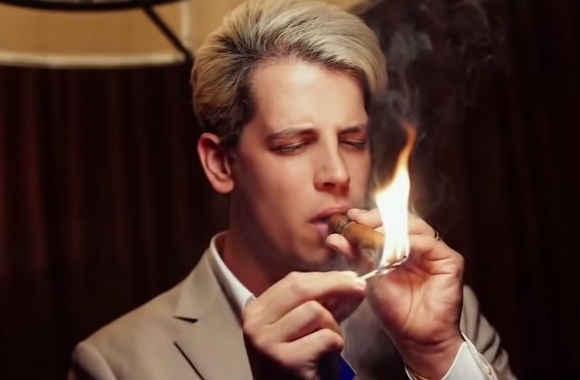
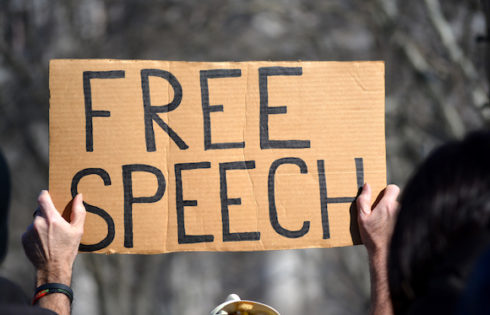


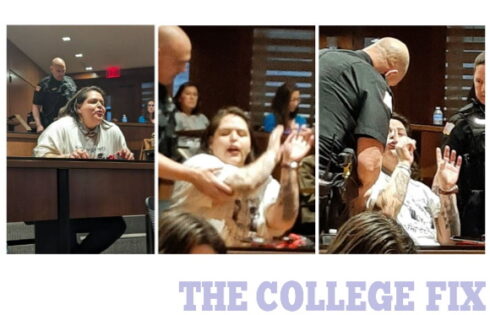

Please join the conversation about our stories on Facebook, Twitter, Instagram, Reddit, MeWe, Rumble, Gab, Minds and Gettr.